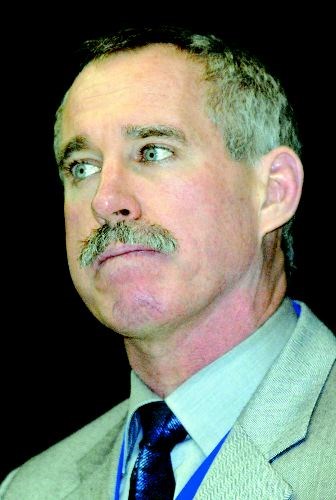No First Nations have signed onto Enbridge Inc.'s ownership offer on its proposed $5.5-billion Northern Gateway oil pipeline, but the company is working to get the offer out to 40 eligible First Nations within weeks.
"No one has signed on the dotted line yet," John Carruthers, the president of Enbridge Northern Gateway, told The Citizen on Wednesday.
Enbridge says the 10-per-cent ownership stake is expected to generate $280 million in profit over the next 30 years. That would provide $233,000 a year to each of the 40 First Nations.
Carruthers said he believes Enbridge has put together a significant benefits package, one where the company will provide the financing for First Nations.
The company is effectively lending money to the First Nations to buy into the project.
Carruthers said the company heard from First Nations they did not have the ability to finance the project, nor did they want to take on risk during construction.
It's why the financing is not triggered until the pipeline starts operation, said Carruthers. The First Nations will receive payments immediately when the pipeline begins operating.
Enbridge has also sweetened their offer with a promise of a 15 per cent portion of the temporary construction jobs and 21 permanent jobs.
"We're pretty excited -- it's creating good dialogue," Carruthers said of the ownership offer. "We do want long-term partnerships with aboriginal communities. We're hopeful."
The company expects First Nations to get contracts on the pipeline as well. The construction and job benefits add up to an estimated $400 million in northern B.C. and Alberta, says Enbridge.
The company says it's also working on a $200 million benefit package for First Nations on the B.C. coast.
First Nations will also be eligible to tap into a community trust expected to generate $100 million during the next 30 years, or $3.3 million a year. The trust is also meant for the benefit of non-aboriginal communities.
Carruthers said the offer has already been presented to about two-thirds of the 40 First Nations. Those First Nations are considered eligible by the company because their communities are within 80 kilometres of the 1,170-kilometre pipeline.
The pipeline, which will pass just north of Prince George, is meant to open up new markets in Asia for crude from the Alberta oilsands.
Carruthers acknowledged that closer to the coast of British Columbia there is less interest. He added the company would have to be invited to a First Nation's community to present its offer.
A majority of 22 First Nations west of Prince George have little appetite to accept the ownership offer.
The First Nations oppose the pipeline largely over concerns of a pipeline or tanker spill.
The Carrier Sekani perspective
Carrier Sekani Tribal Council chief David Luggi said he finds Enbridge's ownership offer inadequate.
Luggi is opposed to the pipeline project, but noted it only seems fair to critique the offer from a business perspective.
"The numbers seem low -- quite low," said Luggi.
Luggi noted that a benefits package First Nations signed on to for the $1.2-billion Pacific Trails natural gas pipeline in northern B.C. gives 15 bands a 30 per cent ownership option that would provide benefits of $540 million to $570 million over 29 years. That's twice the amount of money to less than half the number of First Nations, on a pipeline half the length of Enbridge's, noted Luggi.
Many First Nations consider the natural gas pipeline more benign, particularly, they say, because the gas would dissipate if there is a spill.
First Nations would also have to be provided funding -- with no strings attached -- to conduct their own due diligence on an ownership offer, said Luggi.
That's what happened with the Pacific Trails natural gas pipeline project. The First Nations were provided money that allowed them to hire accounting firm PricewaterhouseCoopers to conduct a preliminary review of the ownership offer in the natural gas pipeline, followed by a more detailed review by accounting firm KPMG.
First Nations in northern B.C. would also want to see their share of the project prorated to the amount of traditional land the pipeline crosses, said Luggi.



